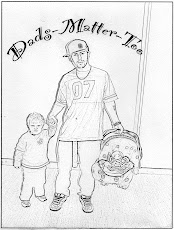New research from the University of Connecticut (http://psr.sagepub.com/content/16/2/103.full) has revealed that the love of a father is one of the greatest influences on the personality development of a child. It concluded that a father’s love contributes as much - and sometimes more - to a child’s development than does a mother’s love. The finding was part of large-scale analysis from more than 500 studies about the power of parental rejection and acceptance in shaping our personalities as children and into adulthood.
Sunday 17 June 2012
Effects of paternal rejection
"In our half-century of international research,
we’ve not found any other class of experience that has as strong and consistent
effect on personality and personality development as does the experience of
rejection, especially by parents in childhood,"' says Ronald Rohner who co-authored the new study in Personality and
Social Psychology Review.
A 13-nation team of psychologists working on the
International Father Acceptance Rejection Project has developed at least one
explanation for this difference: that children and young adults are likely to
pay more attention to whichever parent they perceive to have higher
interpersonal power or prestige. So if a child perceives her father as having
higher prestige, he may be more influential in her life than the child’s
mother.
One important message from this research is that fatherly love is critical to a person’s development. "The importance of a father’s love should help
motivate many men to become more involved in nurturing child care,” Rohner says. Additionally, he added, widespread recognition
of the influence of fathers on their children’s personality development should
help reduce the incidence of 'mother blaming' for trouble children. "The great emphasis on mothers and mothering in America
has led to an inappropriate tendency to blame mothers for children’s behaviour
problems and maladjustment when, in fact, fathers are often more implicated
than mothers in the development of problems such as these.”
The research underlines the need to address the issues surrounding ‘fatherless’ families.
Posted by
Mike
at
09:03
0
comments
![]()
Subscribe to:
Posts (Atom)




